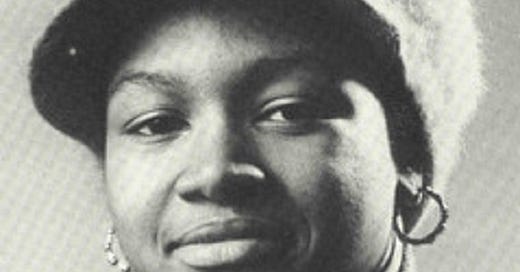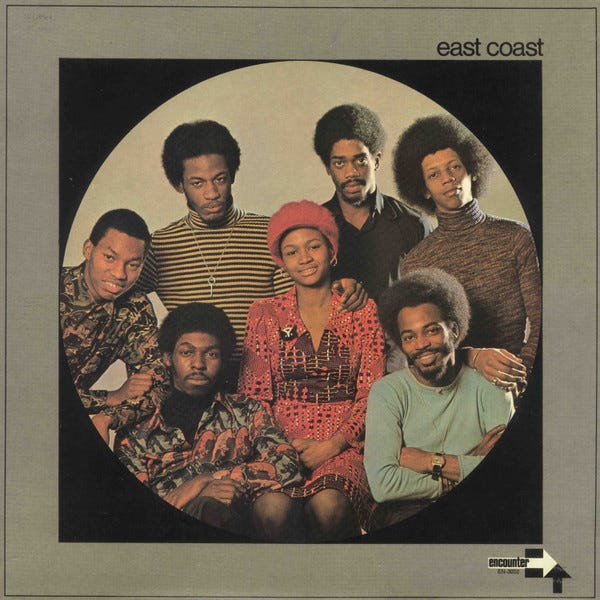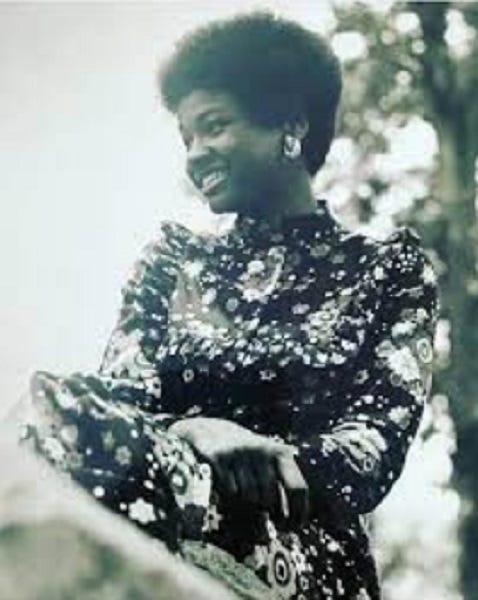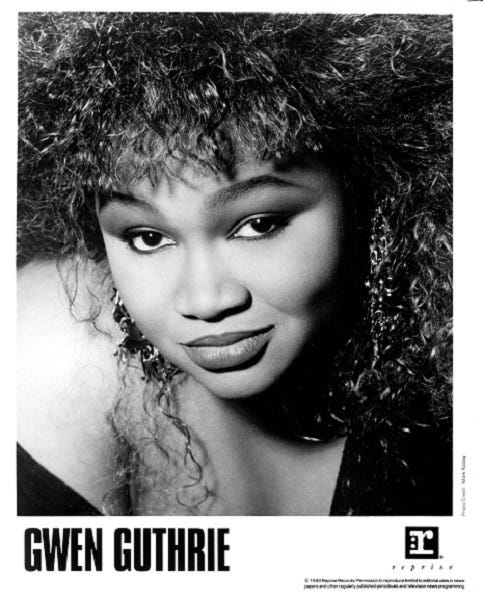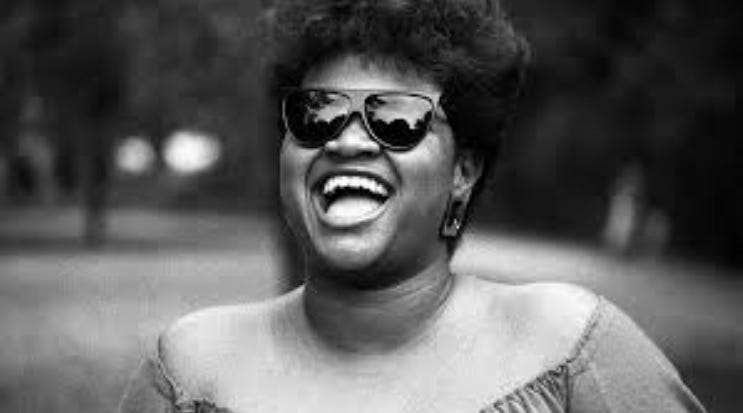Gwen Guthrie (July 9, 1950 – February 3, 1999) – Miss Gigi (1973)
The late great singer/songwriter who passed twenty-five years ago wrote this epic funk jam for her early group East Coast, led by a pre-Cameo Larry Blackmon.
View most updated version of this post on Substack
Search our full archives
Gwen Guthrie was a multi-talented singer/songwriter and pianist who wrote hit songs and sang backup vocals for many other artists before her own successful solo career. In the 1980s she became a club icon, best remembered for her 1986 dancefloor classic “Ain’t Nothin’ Goin’ On But The Rent.”
Born and raised in Newark, New Jersey, Guthrie’s father taught her to play piano when she was eight years old. She sang in her first vocal group in high school, and in her early twenties became a member of the Ebonettes and the Matchmakers.
While singing and playing piano in the latter group, she became romantically involved with trombonist/bassist Haras Fyre (aka Patrick Grant). The two of them plus two other members of the Matchmakers’ horn section joined the NYC-based funk group East Coast in 1972.
East Coast was led by a pre-Cameo Larry Blackmon, and also featured that group’s future keyboardist and Blackmon’s frequent songwriting partner Gregory Johnson. Blackmon and Johnson co-wrote nearly half of the group’s self-titled debut album (including the superb jam “Something Deep Inside”) released in 1973 on Encounter Records, a short-lived label established earlier that year by Bernard Purdie. It was the third release of only five titles issued by the label.
The LP was produced by Larry Clement, who wrote its epic Black Sabbath-esque, socially conscious closing cut “You Can't Let It Get You Down.”
“Brothers and sisters are dying in a war… and no rhyme or reason can explain what for.”
One of the album’s finest tracks was written solely by Guthrie. “Miss Gigi” was her theme song, a very funky, cinematic instrumental jam.
Guthrie and Fyre began writing songs together. The producer of East Coast’s never-finished second album told them their material was “unsellable” and had no commercial value. Luckily, The Commodores’ then-manager Benny Ashburn helped them shop their demos around, which attracted the attention of producer Bert DeCoteaux. He hired them as staff songwriters for the music publishing company Penumbra Music.
One month after Guthrie and Fyre left East Coast, they had their first hit song on the charts. The phenomenal jam “Love Don’t You Go Through No Changes On Me” was the debut single from a group of four sisters called Sister Sledge, and went to #5 on the Billboard Hot 100.
In 1974, she and Fyre wrote the stunning track “This Time I’ll Be Sweeter,” which has since been recorded over eighty times. The first released version was by Martha Reeves of Martha and the Vandellas and issued as a B-side in May of that year, produced by DeCoteaux and former Main Ingredient member Tony Silvester.
They also produced a beautiful version recorded by UK singer Linda Lewis, featuring Guthrie and Deniece Williams on backing vocals, which was released in June in the U.S. as the lead single from her Not A Little Girl Anymore LP. Lewis memorably performed it live in 1975 on the Austrian TV show Spotlight.
DeCoteaux and Silvester produced another version for the recently departed Marlena Shaw that was included on her 1976 Just a Matter of Time LP. Grant later asserted this was in fact the song’s original recording, dating from 1974.
Guthrie and Fyre parted ways with DeCoteaux and Penumbra Music before long. In late 1974, one of Aretha Franklin’s backup singers got sick right before a session, and Guthrie took her place. She went on to sing backing vocals for artists including Stevie Wonder, Roberta Flack, Bob James, Stephanie Mills, Ray Charles, and Madonna, notably appearing on her 1983 self-titled debut album.
In the early eighties, Guthrie’s career as a solo artist began to blow up. She recorded the duet “Nothing But Love” with reggae great Peter Tosh, which reached #43 R&B and spent 11 weeks on the charts. She started collaborating with producers Sly & Robbie (Sly Dunbar and Robbie Shakespeare), who produced her 1982 self-titled debut album on Island Records. Its lead single “It Should Have Been You” was remixed by Paradise Garage DJ Larry Levan and hit #11 on dance charts and #27 R&B. Guthrie wrote its follow up single, the superb dub jam “Peek-A-Boo.”
Levan remixed several more major club hits for Guthrie, including “Peanut Butter,” “Seventh Heaven,” and “Hopscotch,” all off her second full-length album Portrait (1983). She performed at the Garage many times, and was eventually dubbed “The First Lady of the Paradise Garage.”
In 1983, Guthrie recorded a new Sly & Robbie-produced track “Padlock” at Compass Point Studios in the Bahamas. It was remixed by Levan and released on 12” vinyl at the time, but two years later resurfaced as a huge hit when it became the title track to the mini-LP Padlock (Special Mixes) containing five Levan remixes of Guthrie’s club hits. “Padlock” reached #13 on dance charts, climbed to #25 R&B, and was heard all over New York City during the summer of 1985.
This set the stage for Guthrie’s all-time biggest anthem, “Ain’t Nothin’ Goin’ On But The Rent.” Released in 1986 as the lead single from her fourth album Good To Go Lover, it shot to #1 R&B and also topped dance charts. Guthrie wrote and produced the track herself.
Sadly, Guthrie died of uterine cancer exactly twenty-five years ago on February 3, 1999. She was only 48 years old.
Rest in Power, Gwen Guthrie.
Further info:
“Interview with Gwen Guthrie,” by Mark Berbiers, Blues & Soul Magazine, 1990s.
“Obituary: Gwen Guthrie,” The Independent (UK), February 15, 1999.
“This Day In Music: R&B legend Gwen Guthrie dies of cancer,” Billboard, February 4, 2006.
#soul #funk #disco #Cameo #ParadiseGarage #LarryLevan #GwenGuthrie


